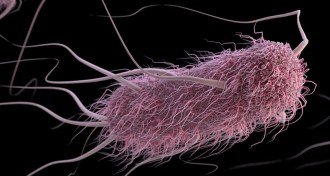News
-
 Paleontology
PaleontologyHow birds may have escaped the dino-killing asteroid impact
A tree-loving lifestyle became a risk for ancient birds in a world-changing catastrophe.
By Susan Milius -
 Paleontology
PaleontologyThe Chicxulub asteroid impact might have set off 100,000 years of global warming
About 66 million years ago, the Chicxulub asteroid impact set off 100,000 years of global warming, an analysis of oxygen in fish fossils suggests.
-
 Astronomy
AstronomyPlasma rain in the sun’s atmosphere falls in surprising places
Scientists found rain in the sun’s corona where they didn’t expect it, which could help solve the mystery of why the corona is so hot.
-
 Genetics
GeneticsGenetic sleuthing again IDs a murder suspect in a cold case
The arrest of a second murder suspect with the help of genetic genealogy raises worries that suspicionless searches may be next.
-
 Animals
AnimalsA caterpillar outwits corn defenses by gorging on fattening ‘junk’ food
The crop plants defend themselves with zombie-maker wasps, but one pest has a desperate work-around.
By Susan Milius -
 Psychology
PsychologyGun owner or not, Americans agree on many ways to limit gun violence
A new survey suggests that gun owners support many potential gun-control policies — now research on their efficacy needs to catch up.
-
 Health & Medicine
Health & MedicineWhat we know about the Ebola outbreak, and the vaccine that might help
Even as an experimental vaccine arrives in Congo to contain the virus, there are worrisome signs Ebola has spread to a city.
-
 Earth
EarthKeeping global warming to 1.5 degrees C helps most species hold their ground
Holding global warming to 1.5 degrees Celsius by 2100 could help protect tens of thousands of insect, plant and vertebrate species.
-
 Anthropology
AnthropologyAncient Chinese farmers sowed literal seeds of change in Southeast Asia
Two waves of ancient migration from China to Southeast Asia spread farming and languages.
By Bruce Bower -
 Life
LifeYour blood type might make you more likely to get traveler’s diarrhea
People with type A blood are more likely to develop severe diarrhea from E. coli infections.
-
 Agriculture
AgricultureNanoparticles could help rescue malnourished crops
Nanoparticles normally used to fight cancer could also be used to treat malnourished crops.
-
 Animals
AnimalsGreen blood in lizards probably evolved four times
Pigment buildups that would cause jaundice in people are normal for some New Guinea skinks.
By Susan Milius